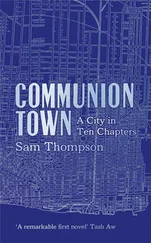Frank Tallis - Deadly Communion
Здесь есть возможность читать онлайн «Frank Tallis - Deadly Communion» весь текст электронной книги совершенно бесплатно (целиком полную версию без сокращений). В некоторых случаях можно слушать аудио, скачать через торрент в формате fb2 и присутствует краткое содержание. Жанр: Исторический детектив, на английском языке. Описание произведения, (предисловие) а так же отзывы посетителей доступны на портале библиотеки ЛибКат.
- Название:Deadly Communion
- Автор:
- Жанр:
- Год:неизвестен
- ISBN:нет данных
- Рейтинг книги:3 / 5. Голосов: 1
-
Избранное:Добавить в избранное
- Отзывы:
-
Ваша оценка:
- 60
- 1
- 2
- 3
- 4
- 5
Deadly Communion: краткое содержание, описание и аннотация
Предлагаем к чтению аннотацию, описание, краткое содержание или предисловие (зависит от того, что написал сам автор книги «Deadly Communion»). Если вы не нашли необходимую информацию о книге — напишите в комментариях, мы постараемся отыскать её.
Deadly Communion — читать онлайн бесплатно полную книгу (весь текст) целиком
Ниже представлен текст книги, разбитый по страницам. Система сохранения места последней прочитанной страницы, позволяет с удобством читать онлайн бесплатно книгу «Deadly Communion», без необходимости каждый раз заново искать на чём Вы остановились. Поставьте закладку, и сможете в любой момент перейти на страницу, на которой закончили чтение.
Интервал:
Закладка:
‘No.’
‘You are good friends?’
‘Yes. It was Fraulein Wirth who got me my job here at the laundry.’ She paused and added. ‘She isn’t in today. Is she all right?’
Rheinhardt looked upwards. Steam from the waste pipe drifted across the thin strip of sky.
‘Could I ask: when was the last time you saw Fraulein Wirth?’
‘Thursday night.’
‘The night before last …’
‘Yes.’
‘And how was she?’ Frau Lachkovics appeared mystified by his question. ‘Was Fraulein Wirth the same as she usually is? Or did you notice anything different about her?’
‘She didn’t look unwell, if that’s what you mean.’
‘Did she have any visitors on Thursday?’
Frau Lachkovics thought for a moment then said: ‘Yes — she did. A friend.’
‘Who?’
‘A lady. Frau Vogl.’
‘Frau Vogl,’ Rheinhardt repeated.
The name sounded vaguely familiar. He had an odd feeling that he had heard it only recently during a conversation with his wife.
‘Yes,’ said Frau Lachkovics. ‘An old friend. They go back a long way. She’s quite a well-to-do woman. I met her once, a very fine lady … and such clothes.’
She shook her head and looked down at her shabby dress.
‘Do you remember what time it was when Frau Vogl visited Fraulein Wirth?’
‘It must have been early evening. I looked out the window and saw her leaving. Her carriage came into the yard.’
‘Tell me … did anything unusual happen on Thursday night?’
‘No,’ said Frau Lachkovics. ‘Nothing unusual happened.’
Jana, who had been very still — almost absent — pulled at her mother’s skirt. It was a peculiar thing for a girl of her age to do. Rheinhardt looked at Jana’s face and realised that her void expression was probably the result of some defect of the brain. He thought of his own bright daughters and felt a stab of pity for Frau Lachkovics.
‘What is it, Jana?’ said Frau Lachkovics.
‘I heard someone,’ the girl answered. ‘You’d gone to bed — but I was still up looking at one of Selma’s books. I heard someone walking. I went out onto the landing and called: “Is anyone there?”’ She cupped her hands around her mouth to demonstrate.
Frau Lachkovics’s surprise rapidly turned to anxiety.
‘Why ever did you do that?’
‘No one answered.’
‘Jana? Why didn’t you tell me?’
The girl’s face was blank again: an impassive mask.
‘My dear,’ said Rheinhardt, ‘try to remember what you heard. It might be important and I would very much appreciate your help.’
‘Footsteps,’ said the girl.
‘Loud, soft, slow, fast? What kind of footsteps?’
She paused and replied ‘Footsteps’ — as if, on reflection, no further qualification was necessary.
‘Did you see anyone?’
‘No.’
Frau Lachkovics put her arm around her daughter and drew her closer.
‘Inspector, what has happened?’
Rheinhardt took out his notebook and began to write.
‘Has Fraulein Wirth had any other visitors? A gentleman friend, perhaps?’
Frau Lachkovics shook her head, this time with considerable force. Rheinhardt suspected that she might be trying to protect her friend’s honour.
‘Come now,’ said Rheinhardt. ‘It is perfectly reasonable for a woman to enjoy the company of a gentleman. She must have had … admirers?’
‘No. Not Selma. She isn’t interested. She doesn’t want anything to do with men.’
‘Why ever not?’
‘She is lame, did you know that? She can walk, but she gets tired and needs a stick. The muscles are weak. I think she is ashamed.’
‘And what about you, Frau Lachkovics? Do you have any gentlemen friends?’
‘No,’ the woman said firmly. ‘Not after Lachkovics.’ Her hand rose up and she touched her face, as if the sting of a hard slap — administered many years ago — still tingled on her cheek. She shrugged. ‘We don’t need anyone else now. We can cope on our own — me and Jana. We have our little home — and our work — and our friends. We are quite happy — aren’t we, Jana?’ She shook the girl’s shoulders and the movement placed a feeble smile on the young woman’s face. ‘But inspector — what are you asking me all these questions for? She is all right — isn’t she? Selma?’
‘Her rent has not been paid for three months.’
‘Oh. I see. You’ve spoken to Herr Shevchenko.’
‘I have. Why did she get so far behind?’
‘She’s always spending money on doctors. Trying to find a cure. She can’t accept that nothing can be done. You’re not going to arrest her, are you? It isn’t a great sum of money and she’ll pay it back.’
Rheinhardt looked into the woman’s pleading eyes. He found that he had to force himself to speak: ‘I have some terrible news.’ Dismissing thoughts of impropriety he reached out and held her hand. ‘I am afraid Fraulein Wirth is dead.’
Frau Lachkovics appeared stunned. Her mouth worked wordlessly until she finally managed to cry: ‘Oh, Jana.’
Apart from a slight tensing of her brow, the daughter seemed indifferent to her mother’s grief.
Above their heads the waste pipe continued to discharge steam into the atmosphere. Its beat had begun to coincide with a pulse of pain in Rheinhardt’s head.
32
Erstweiler appeared comfortable, but a muscle beneath his left eye was quivering.
‘To be honest, Herr doctor, I didn’t like my father. He was a domineering man who always thought he was right. I don’t know how my mother put up with him. She was the opposite: a diminutive, genial creature, always prepared to listen to both sides of an argument. My grandfather — my mother’s father — was somewhat impecunious, and I suspect that her family forced her into the marriage. Father was not wealthy, by any means, but he had a secure job in the railway office.’ Erstweiler produced a crooked, sardonic smile: ‘Although he never ascended as far up the bureaucratic hierarchy as my brother — and was never obliged to don the garb of a general!’
Liebermann waited. He could see in his patient’s eyes that memories were surfacing.
‘I remember,’ Erstweiler continued. ‘I once accompanied my father on a trip to Vienna. I forget why. Indeed, I’ve forgotten virtually everything that happened, except one thing. We were walking past the Stephansdom and my father said we should climb to the top in order to see the view. We began our climb, and almost immediately I felt apprehensive. I looked out of the narrow windows and it made me feel dizzy. I remember seeing the Habsburg eagle on the cathedral roof … the city below. I didn’t want to go any higher: I thought the whole spire might tumble down. My father asked me what was the matter and I said: I don’t feel well.’ The memory was so vivid that Erstweiler’s voice suddenly acquired the timbre of a frightened child’s: ‘Nonsense! said my father. There’s nothing wrong with you!’ Again, Erstweiler’s voice changed, becoming officious and unsympathetic. ‘He dragged me up — higher and higher — and I began to cry. He lost his temper and called me cowardly, told me to be a man … told me to stop acting like a milksop. When we reached the viewing room at the summit I sat down on a bench and refused to look out. Even a glimpse of those rooftops, so far below, made my head spin. He pointed out a girl in a pink dress and said, Look! Even she has more courage than you! My father was disgusted with me. He left me there, on my own, full of shame and anger, while he walked around — enjoying the view. I longed for my mother. If she had been present, she would never have let this happen … After a while, I asked my father if we could go down. No, he said. I want to hear the Pummerin. He told me that the great bell had been made from the melted cannons that the gutless Turks had left behind when they fled the city. What did I care … about that?’
Читать дальшеИнтервал:
Закладка:
Похожие книги на «Deadly Communion»
Представляем Вашему вниманию похожие книги на «Deadly Communion» списком для выбора. Мы отобрали схожую по названию и смыслу литературу в надежде предоставить читателям больше вариантов отыскать новые, интересные, ещё непрочитанные произведения.
Обсуждение, отзывы о книге «Deadly Communion» и просто собственные мнения читателей. Оставьте ваши комментарии, напишите, что Вы думаете о произведении, его смысле или главных героях. Укажите что конкретно понравилось, а что нет, и почему Вы так считаете.












